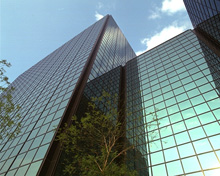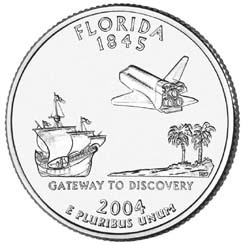
- Capital City:
- Tallahassee
- Nickname:
- Sunshine State / Peninsula State
- Motto:
- In God We Trust
- Statehood:
- March 3, 1845 (27th)
- Origin of State's Name:
- Named on Easter 1513 by Ponce de Leon for Pascua Florida, meaning "Flowery Easter."
- Largest Cities:
- Jacksonville, Miami, Tampa, Saint Petersburg, Hialeah
- Border States:
- Alabama, Georgia
- Land Area:
- 53,997 sq. mi., 26th largest
- State Bird:
- Mockingbird
- State Flower:
- Orange blossom (citrus sinensis)
- State Tree:
- Sabal Palmetto (cabbage palmetto)
- State Song:
- Suwannee River
Called the "Sunshine State," Florida is known for its balmy, sunny weather and beautiful beaches. Ponce de Leon, in search of the elusive fountain of youth, was the first European to explore Florida. St. Augustine, founded by the Spanish in 1565, is the oldest permanent European settlement in the continental United States. Statehood for Florida came in 1845. Florida's state flower is the orange blossom, which is particularly fitting because oranges are a main export of the state. Because of its shape and location, a long peninsula between the Atlantic Ocean and the Gulf of Mexico, Florida attracts millions of visitors each year to its many seaside resort areas. Its capital is Tallahassee.
John F. Kennedy Space Center
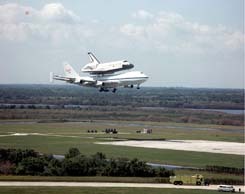
John F. Kennedy Space Center Florida is where America's space program all began. It is home to the John F. Kennedy Space Center of the National Aeronautics and Space Administration, better known as NASA.
By nature, human beings are explorers. For thousands of years, we've pushed beyond our boundaries, broadening our minds and imaginations with each new discovery.
That same spirit of exploration has long been the driving force for NASA and the Kennedy Space Center.
On May 5, 1961, a Mercury-Redstone rocket lifted off from Cape Canaveral with astronaut Alan Shepard, making him the first American in space and launching the dreams of a generation.
Hundreds of people have followed since that pioneering mission, from the lunar explorers of the Apollo program to the crews living and working each day on the International Space Station. Every NASA human space mission began its tremendous journey with a liftoff from the launch pads along this Florida shoreline.
The center is also home to NASA's Launch Services Program, which launches advanced probes and satellites on missions to unlock the secrets of our planet, as well as our planetary neighbors and the universe beyond. Just a few examples are the Mars Exploration Rovers, the Cassini mission to Saturn, the Deep Impact journey to Comet Tempel 1, and the Solar and Heliospheric Observatory (SOHO) sun-observing spacecraft.
This heritage of achievement spans nearly 50 years, and we build on this tradition with every successful mission and each new discovery.
Today, NASA is on the edge of a bold new challenge: the Constellation Program. This ambitious new endeavor calls for us to return human explorers to the moon and then venture even farther. As the nation's premier spaceport, Kennedy Space Center will play a critical role in this new chapter in exploration. We're preparing for an amazing future as the assembly, test and launch site for the next generation of crew and cargo vehicles.
Daytona 500
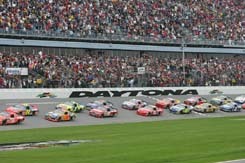
On February 22, 1959, the Daytona International Speedway opened to host the first Daytona 500. The posted awards for the "500-mile International Sweepstakes" totaled $67,760. A field of 59 cars competed before a crowd of more than 41,000 fans. It took three days to determine that Lee Petty was the winner of the "close call" finish over Johnny Beauchamp.
The history of automotive competition can be traced back to 1903, when two gentlemen placed a friendly wager on who had the fastest horseless carriage. Until 1935, the wide and hard-packed sands of Daytona Beach provided the venue for years of speed trials, called Land Speed Record Runs. In 1936 stock car racing began on the beach. The original 3.2-mile course had a north turn located just south of town; half the course was on the beach, and half was on paved public roadway. A local mechanic, Bill France, entered the inaugural race and finished fifth. Stock car racing halted during World War II, and resumed in 1946 when France began promoting stock car and motorcycle races on the beach. He initiated organizational meetings in late 1947 for NASCAR, the National Association for Stock Car Auto Racing, which was founded in early 1948.
As the Daytona Beach area developed and grew in population, the motor races, which were also attracting larger audiences, moved to the quieter southern part of the beach, and eventually grew too big for that area. Since race fan and promoter, France built the Daytona International Speedway for approximately $3 million, it has been in continuous operation since 1959. The speedway is the largest sporting arena in the Southeast, and is on property that covers approximately 480 acres, including the track site, offices, parking area, and the 44-acre Lake Lloyd. There are more than 165,000 grandstand seats.
Stock cars use the 2.5-mile tri-oval course and sports cars, motorcycles, and go-karts use the 3.56-mile road circuit. The Speedway currently presents ten separate racing weekends annually, including stock cars, sports cars, motorcycles, go-karts and trucks. Its schedule, which includes two solid months of testing, is more varied than any other racing facility in the world; thus, the Speedway is known as the "World Center of Racing."
Calle Ocho-Miami Carnival
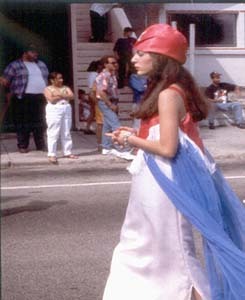
Have you ever tried pinchos, arepas or tamales? These are some of the foods available at the Calle Ocho festival.
In Miami, Florida, there is a large Cuban American population, and every year they have a Calle Ocho festival. Calle Ocho (pronounced kye-yay oh-cho) means "eighth street" in Spanish and is the single largest celebration of Latino culture in the United States. Eighth Street is the most popular street in "Little Havana" and is Miami's center of Cuban culture.
Calle Ocho is an enormous street party, and entire streets are blocked off to make room for music, dance, visual arts, food and other fun! Calle Ocho started in 1978 to bring the Hispanic community together, and it was so popular that although only 10,000 people were expected, more than 100,000 showed up! Each year the festival grows and today the event is known as Carnaval Miami and is celebrated over two weekends in March.
Chiefland Watermelon Festival
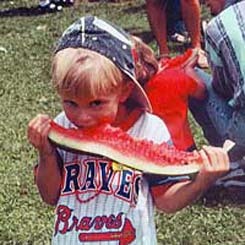
You might know that watermelons are 92 percent water, but did you know that they came from the Kalahari Desert in Africa?
The first recorded watermelon harvest took place 5,000 years ago in Egypt. Pictures of the fruit were found in paintings on the walls of ancient buildings. From there, the fruit spread to other countries by merchant ships. It is believed that watermelon came to the United States with African slaves.
The people of Chiefland, Florida, have held a Watermelon Festival every June since 1954 to celebrate the city's watermelon farmers and to bring the community together for a family-day celebration. The festival includes many activities. One of the favorites is a watermelon seed-spitting contest. Free cold watermelon, donated by local growers, is served throughout the day. There's also a parade made up of floats with a watermelon theme, high school bands, fire engines, and cars featuring contestants of the Watermelon Festival Queen contest.
Edison Pageant of Light
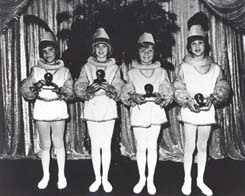
Do you know what the kids in the photo are doing? They are holding busts of Thomas Edison for a performance in the Edison Pageant of Light.
The people in Fort Myers, Florida, have been celebrating Thomas Edison's birthday since February 1938. Edison moved to Fort Myers with his wife, Mina, for health reasons. In the bright, warm sunshine and under big blue skies, Edison's health was restored. He liked Fort Myers so much that he stayed and built a laboratory there in 1887. Every year he threw himself a birthday party, and important guests like Harvey Firestone and Henry Ford would attend.
Today, Edison's birthday is celebrated as a three-day event that includes a royal pageant with the highlight being the crowning of a king and queen of the mythical realm of Edisonia. Edison's birthday party also includes many bands and floats, a Baby Parade, fireworks, stadium show, a flower show, arts and crafts show, golf and tennis tournaments, professional square dancing and musical performances.
Now that's a big birthday party! But most people would agree that someone who invented the phonograph, the motion picture camera, and 1,000 other inventions deserves to be honored in this way!
Florida Relocation
If your are considering relocating to Florida, this Florida Relocation Guide will give you essential information on Schools, Voting, Drivers License,real estate, etc.
 Print
Print Email
Email






